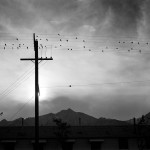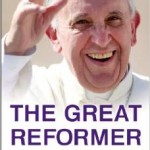My piece over at First Things this week, recounts the unusual, and ultimately rather empty-feeling Palm Sunday liturgy I experienced last weekend:
It struck me as odd that the same people who say they wish to “build up the community of the People of God,” and who often decry what they see as “limitations” to the role of the laity, completely omitted any interaction between themselves and the people in the pews. The Gospel reading for Palm Sunday is the only one inviting lay participation, yet none was permitted. That seems a terrible mistake and a loss.
Without our collective calls for Barabbas, for the Crucifixion of Christ, and for Jesus to save himself, we lost an opportunity to be appalled by ourselves. We were denied a chance to once more glean some sound theological, spiritual, and personal insights into how often we choose what is worst, rather than best, for us; the assist that we give to the destruction of the Body of Christ when we advance the brokenness of the world; the lazy service we give to our cynicism.
Yes, I know, we’re all supposed to feel very good about ourselves as beloved children of God, but it seems to me that on this Sunday entering into Holy Week, we ought to be allowed to acknowledge what miserable bastards we all can be, and feel a little lousy about it, at least for the length of a liturgy.
 You can read the whole thing, here. I found it disappointing. Aside from the fact that the exercise seemed rather Evangelical/Protestant to me (in both its passivity and the fact that it omitted the Last Supper, and thus our understanding of the institution of the Holy Eucharist and the priesthood) I had my head all ready for one sort of liturgy — a profoundly moving one that pricks the conscience and even costs us something, in terms of endurance — and found myself subjected to something entirely different.
You can read the whole thing, here. I found it disappointing. Aside from the fact that the exercise seemed rather Evangelical/Protestant to me (in both its passivity and the fact that it omitted the Last Supper, and thus our understanding of the institution of the Holy Eucharist and the priesthood) I had my head all ready for one sort of liturgy — a profoundly moving one that pricks the conscience and even costs us something, in terms of endurance — and found myself subjected to something entirely different.
This changed liturgy didn’t work for me (nor for my family member who attends that parish) but different is not always bad — sometimes it’s refreshing, other times it helps to deepen understanding or broaden perspective. The upcoming Way of the Cross described here by Deacon Greg is a case in point. Overseen by the Maronite Patriach (at the request of Benedict) and written by young Lebanese Christians, the text is gorgeous and surprising, and it will hit a widely unifying note at the Colosseum, this Friday.
Something else different: normally in these weeks leading up to Holy Week, the press would be offering us juicy opportunities to doubt the gospel. These are usually the weeks reserved for questions about whether or not Jesus existed at all; if he had a wife and so forth. This year, thanks to Benedict’s surprising resignation, the conclave and Pope Francis’ rock-star ascendancy, the press has had its hands full; there has been no opportunity to push back forcefully against the Rome-based images of drama, gasp-inspiring beauty, palpable joy and — dare I say it — rock-like continuance, that have been rolling out before our eyes these past weeks while the whole secular world is being roiled by political redefinition and uncertainty on issues of economy, war, elitism. Here in America we are almost ready to deconstruct a fundamental social understanding common to every culture for thousands of years, because of a conceit that we have become so much more enlightened, in the last fifty.
Msgr. Charles Pope looks at all of that uncertainty in light of Christ’s words and finds something unusual in their eerie relevance:
Yes, said the Lord to those ancient women, in effect, “You think this is bad? The days are actually coming when things will be so bad and so dark that people will celebrate NOT having children, will celebrate barrenness.”
But the Lord does not stop there. He goes on to describe quite well the culture of death so literally lived out in our times: people will say to the mountains, ‘Fall upon us!’ and to the hills, ‘Cover us!’
One may argue that this is just a Jewish way of speaking that indicates despair. Perhaps. But we live it out quite literally in our times, for it is the refrain of the culture of death. And what is the culture of death? It is the mentality that increasingly sees the death or non-existence of human beings as the “solution” to problems. In our times there has arisen a group of radicals who see human beings as a hindrance to their ecological goals, and they seek population reductions and even dream of a pristine earth without humanity. They peddle History Channel programs such as “Life after People” as a kind of fantasy of their vision and advocate contraceptive and abortive policies that see mankind as the problem that must be eliminated. In effect they cry to the mountains “fall on us” and dream of a world that is “post-human.” They even peddle disaster movies as though they were longing for it all.
You may say, I exaggerate. Fine. But would you ever dream we would be were we are today in fifty short years of social engineering, and anti-life policies?
It feels like the most unusual Holy Week in my memory, a week of things happening very fast, and fragmenting along increasingly unpredictable lines; so little may be counted on at the moment, not even the sillier aspects of the season.
 And yet, as I look around and scan the headlines, it’s the news coming out of Rome — specifically from the small area patrolled by Swiss Guards who take a knee in salute during a moment of Adoration — that is heartening and reassuring to me. Amid all that is ever-new in Francis (and in the tantalizing possibilities of Christian reunification given serious momentum by Benedict, and of great interest to his successor) there resides within that church in Rome a reality ever-ancient and of-a-piece.
And yet, as I look around and scan the headlines, it’s the news coming out of Rome — specifically from the small area patrolled by Swiss Guards who take a knee in salute during a moment of Adoration — that is heartening and reassuring to me. Amid all that is ever-new in Francis (and in the tantalizing possibilities of Christian reunification given serious momentum by Benedict, and of great interest to his successor) there resides within that church in Rome a reality ever-ancient and of-a-piece.
UPDATE:
I spoke a little too soon: just in time for Holy Week this garbage on Broadway
Related:
Young Inmates Eager for Holy Thursday Mass with Francis. Many are Muslim.
Polling on the Mass













